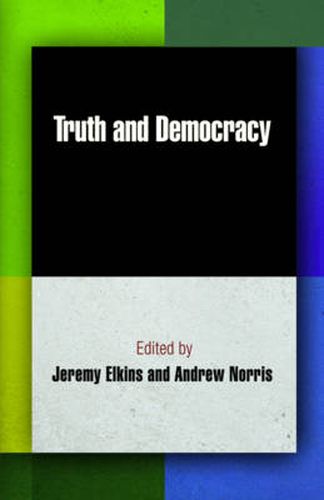Readings Newsletter
Become a Readings Member to make your shopping experience even easier.
Sign in or sign up for free!
You’re not far away from qualifying for FREE standard shipping within Australia
You’ve qualified for FREE standard shipping within Australia
The cart is loading…






Political theorists Jeremy Elkins and Andrew Norris observe that American political culture is deeply ambivalent about truth. On the one hand, voices on both the left and right make confident appeals to the truth of claims about the status of the market in public life and the role of scientific evidence and argument in public life, human rights, and even religion. On the other hand, there is considerable anxiety that such appeals threaten individualism and political plurality. This anxiety, Elkins and Norris contend, has perhaps been greatest in the humanities and in political theory, where many have responded by either rejecting or neglecting the whole topic of truth.
The essays in this volume question whether democratic politics requires discussion of truth and, if so, how truth should matter to democratic politics. While individual essays approach the subject from different angles, the volume as a whole suggests that the character of our politics depends in part on what kinds of truthful inquiries it promotes and how it deals with various kinds of disputes about truth. The contributors to the volume, including prominent political and legal theorists, philosophers, and intellectual historians, argue that these are important political and not merely theoretical questions.
$9.00 standard shipping within Australia
FREE standard shipping within Australia for orders over $100.00
Express & International shipping calculated at checkout
Political theorists Jeremy Elkins and Andrew Norris observe that American political culture is deeply ambivalent about truth. On the one hand, voices on both the left and right make confident appeals to the truth of claims about the status of the market in public life and the role of scientific evidence and argument in public life, human rights, and even religion. On the other hand, there is considerable anxiety that such appeals threaten individualism and political plurality. This anxiety, Elkins and Norris contend, has perhaps been greatest in the humanities and in political theory, where many have responded by either rejecting or neglecting the whole topic of truth.
The essays in this volume question whether democratic politics requires discussion of truth and, if so, how truth should matter to democratic politics. While individual essays approach the subject from different angles, the volume as a whole suggests that the character of our politics depends in part on what kinds of truthful inquiries it promotes and how it deals with various kinds of disputes about truth. The contributors to the volume, including prominent political and legal theorists, philosophers, and intellectual historians, argue that these are important political and not merely theoretical questions.